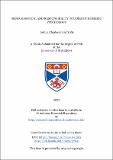Mind, emotion, and responsibility : studies in Homeric psychology
Abstract
I examine several aspects of Homeric psychology, deploying a variety of theoretical approaches, whilst orienting my discussion around the ideas of three classical scholars: Bruno Snell, Eric Dodds, and Arthur Adkins. After a methodological and thematic prologue, chapter 1 discusses the work of Snell, especially his ‘Discovery of the Mind’, and how the radical and now unpopular ideas about the ‘Homeric mind’ expressed there might, in light of recent work within linguistics and an exploration of Snell’s intellectual antecedents, be provisionally and partly rehabilitated. Chapter 2 focuses on Dodds’ ‘The Greeks and the Irrational’ and its relationship to the anthropologist Ruth Benedict’s work, particularly vis-à-vis shame, and how adopting an alternative to the view that shame is necessarily a ‘social’ emotion might facilitate more complete readings of Homeric scenes in which it is implicated. Chapter 3 concerns Adkins’ ‘Merit and Responsibility’, exploring how Adkins’ erroneous perspectives on contemporary ethics encouraged his misreading of several Homeric scenes in which responsibility assessments are at issue. This concludes with a reading of ‘Agamemnon’s Apology’ within the ‘Iliad’, through a lens of responsibility tied to ‘aretaic appraisal’, rather than the (in)ability which Adkins privileged. The chapters are followed by an epilogue, in which a key theme connecting the chapters, especially 2 and 3, that of ‘agent-centredness’, touched upon throughout the thesis, is highlighted, and directions for future study proposed.
Type
Thesis, PhD Doctor of Philosophy
Collections
Items in the St Andrews Research Repository are protected by copyright, with all rights reserved, unless otherwise indicated.

